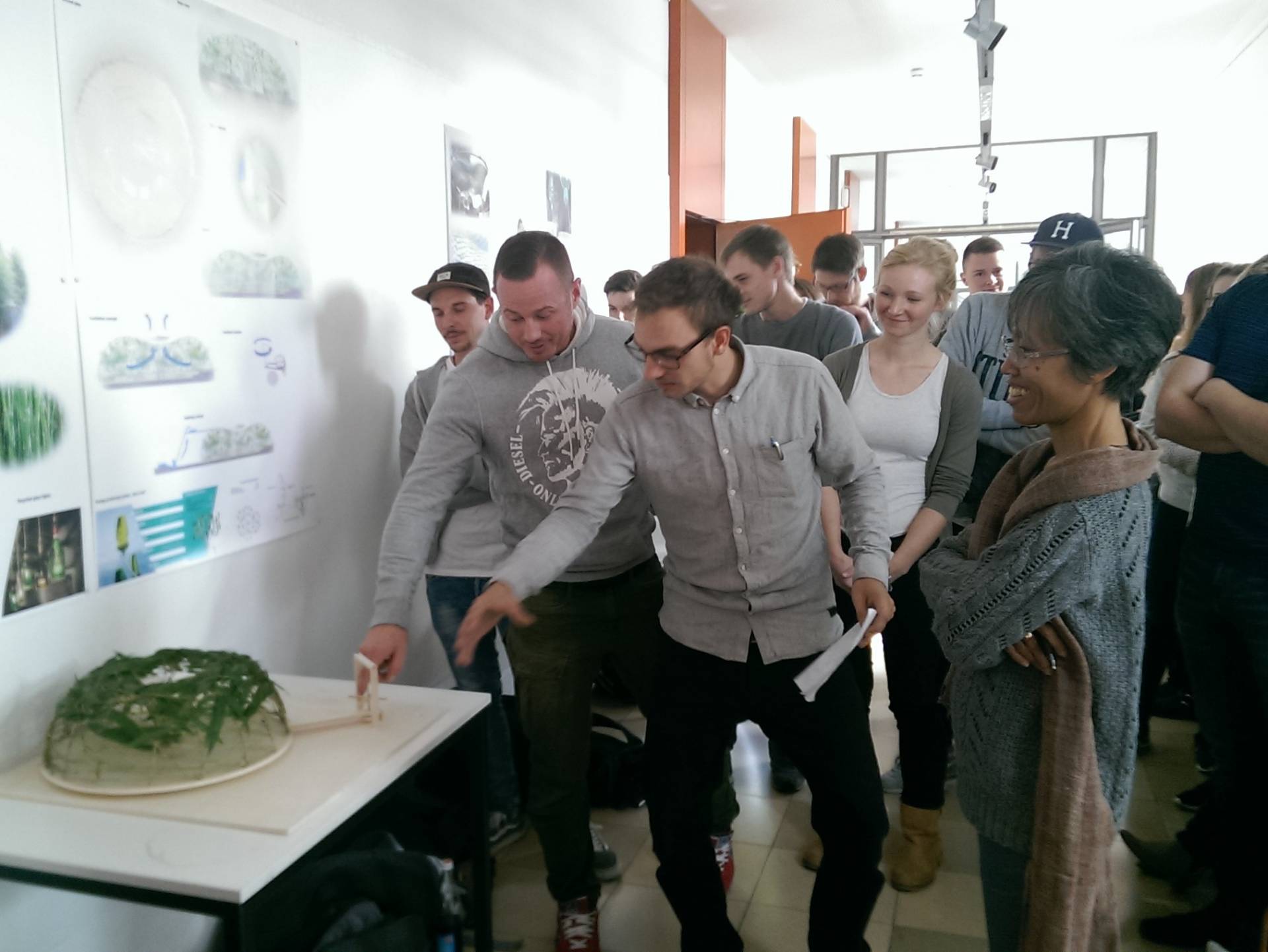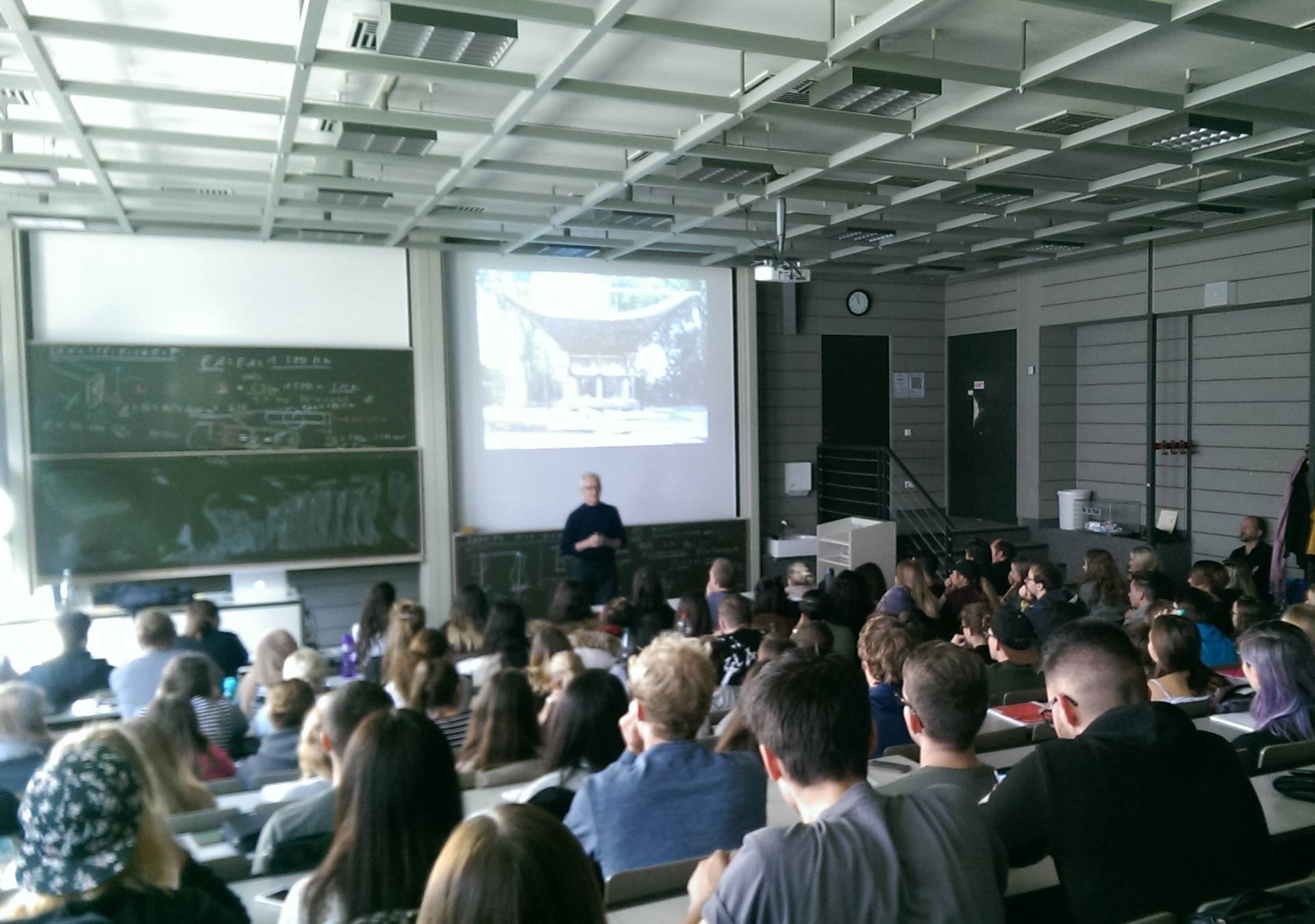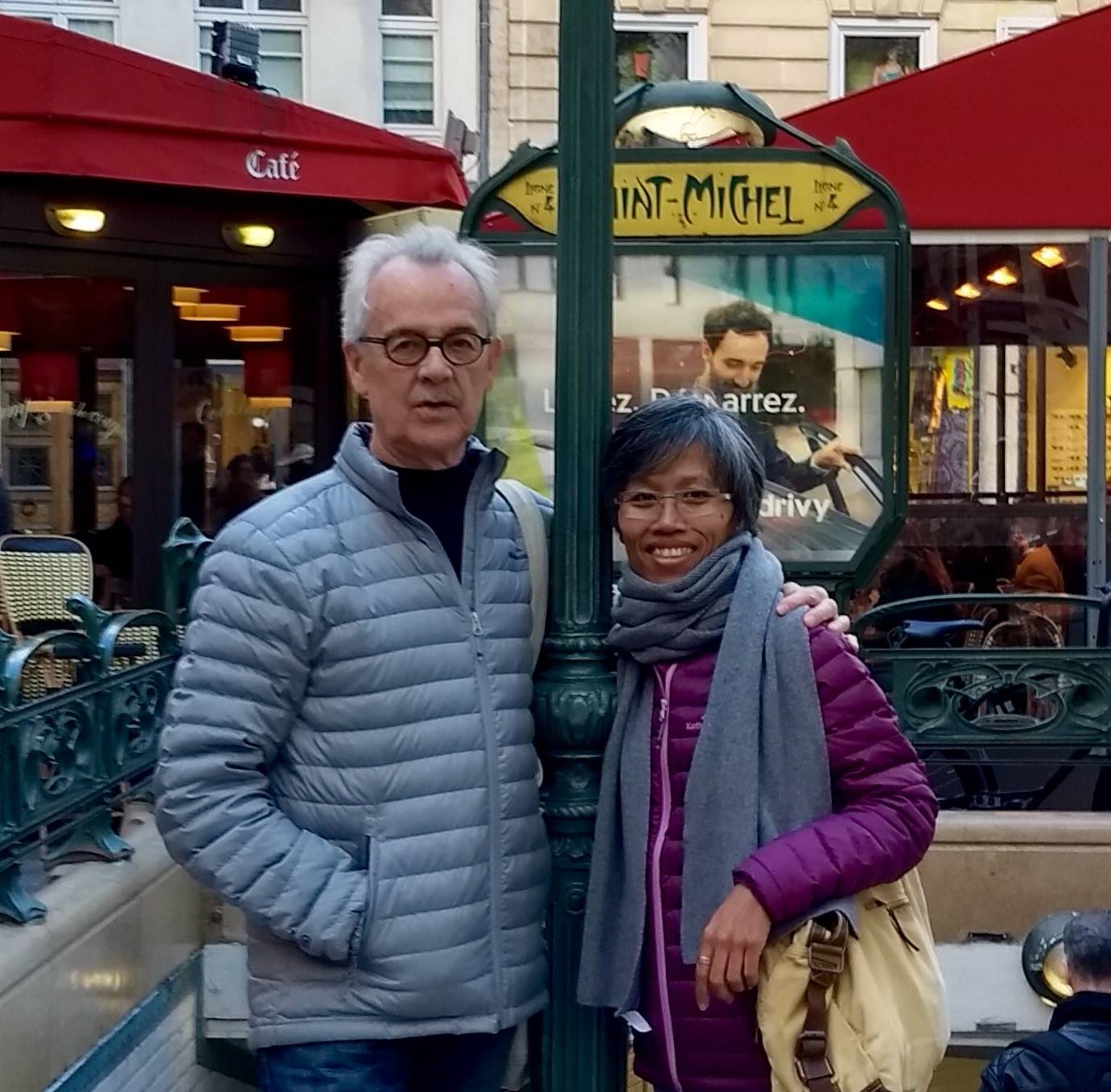
Internationales Professorenehepaar zu Gast
An der Fakultät für Architektur und Bauwesen war das Erfolgsduo, welches an der Udayana Universität in Bali und an der renommierten UNSW University of New South Wales in Sydney unterrichtet, den gesamten Oktober zu Gast. Frau Gusti Ayu Made Suartika ist unter anderem die Direktorin des internationalen Studiengangs in Bali, mit welchem unsere Hochschule erfolgreich Austauschbeziehungen pflegt. Herr Prof. Dr. Cuthbert ist Autor einiger sehr bedeutender Bücher zum Thema Städtebau und Ökonomie und unterstützt die Hochschule Augsburg gerade im Aufbau einer Zusammenarbeit mit der UNSW in Sydney.
Frau Gusti Ayu Made Suartika hat während der vier Wochen an unserer Hochschule einen Kurs in „Tropical Architecture“ für Masterstudierende in Architektur und Energie Effizienz Design gegeben und sich an mehreren anderen Kursen intensiv beteiligt. Herr Cuthbert, obwohl er ursprünglich nur seine Frau auf der Reise begleiten wollte, hat es sich nicht nehmen lassen, sich auch an einigen Kursen mit Gastkritiken zu beteiligen und hat spontan fünf offene Vorlesungen gehalten. Die erste Vorlesung hatte 12 studentische Teilnehmer, danach hatte sich die Teilnehmerzahl überwiegend über Mundpropaganda jedes Mal verdoppelt. Die fünfte Vorlesung hatte über 200 Teilnehmer und damit den großen Vortragssaal der Fakultät beinahe gesprengt.
Für ein Wiederkommen der beiden hat das International Office bereits Unterstützung signalisiert. Auch Lehrende unserer Hochschule sollen nächstes Jahr für einige Wochen an der Udayana Universität unterrichten und es gibt starke Bemühungen auch indonesische Studenten für ein Semester nach Deutschland zu holen. Wir haben an die Udayana Universität seit drei Semestern bisher insgesamt zwölf Austauschstudenten geschickt. Das Bauen in den Tropen ist ein wichtiges Zukunftsthema und beide Seiten können durch dieses Projekt enorm profitieren.
Folgendes Interview haben die beiden Gastwissenschaftler kurz vor unserer Abreise gegeben:
What main impressions do you have from our University and our students?
Ayu: The Department of Architecture-Augsburg University of Applied Science is an academic institution that promotes an independent learning environment. I was impressed by the opportunities the students had for informal learning, access to staff, and discussion, which is always the best support to formal lectures. The library was also an excellent facility with many online features.

Alex: The University is impressive given its excellent facilities, library, staff support, brilliant location and walkable from the city centre. Its concentration is also beneficial to student and staff interaction. The students we met were extremely personable and attentive with a grasp of English that others must envy. We already expected this since our International program currently has 60 German students.
What is your conclusion after the 4 weeks here in Germany and how can you connect to your work in Bali?
Ayu: I fully appreciate the time I spent at your department especially when finding that I was able to share knowledge and get connected with students and academics. I learned a lot from taking part in your teaching programs. Since my own teaching at UNUD is concentrated in the area of architecture and planning, I can see potential opportunities for future collaborations between Augsburg Hochschule and UNUD. One obvious and immediate instance here is bridging a partnership in the area of energy efficient design. This can be approached at all scales from urban areas down to building design and detailing. This can be implemented in both undergraduate and postgraduate levels, with a concentration in our case on tropical environment, the use of materials, vernacular traditions etc.
Alex: I consider myself an International person, and I enjoy being a citizen of the world. So it was wonderful being able to accompany my wife to Germany. Our experience was entirely positive, the people, the food, the transport systems, the environment in Augsburg and the overall efficiency that one expects from German people. Our only frustrations were those one normally experiences being in a foreign country with no knowledge of the language and ‘how things get done.’ This takes some time to accommodate. Our work in Bali is directly related to our International program with a combined focus on energy efficiency, climate, sustainability and the universal problems surrounding the concept of ‘the Vernacular’, as well as the fairly universal engagement with design issues and the need for accommodating and extending architectural theory.
What are your main research themes and to which other disciplines they are linked?
Ayu: My background is in the area of Architecture and building construction management. But my research interest has moved somewhat from technology to planning & development, and how they are intertwined with culture. As is well known, discussions on culture and its significance can be applied to many disciplines. One relevant issue here is how culture is represented (in a broader understanding) within our built environment/forms. The problems associated with culture are fundamental but seldom really applied as a generic force within built environment disciplines. How lifestyles (an essential element of culture) affect our town, our homes, our offices, our perception on environmentally friendly spatial arrangements and building, and etc. are as critical as those of technology and the aesthetic choices we make as architects.
Alex: I share a somewhat similar background to Ayu – Undergraduate degree in Architecture, Masters in Urban Design, Masters in Urban Planning, and Doctor of Philosophy from London School of Economics and Political Science. While I still consider myself an architect and love to teach design studio, my own interests have progressed from architecture across a wide field, and our most recent publication is in the area of Anthropology, the study of the Bali Aga, the ancient people of Bali. Rather than finding this journey weakening my design ideas, I have found that they are strengthened in many different ways. In my own investigations into the built environment I have always found it useful to my knowledge of architecture to stand on the outside and look in, rather than fighting to get out of the goldfish bowl of mainstream architectural theory. So I could sum up my dominant interest as the application of spatial political economy to built environment issues. This engagement resulted in a trilogy – Designing Cities; The Form of Cities; and Understanding Cities, which took ten years to produce. Together they constitute what we might call the end game of architectural theory, from a dominant focus on aesthetics and technology to include that of society and social space.
What are the places you worked before and did your research focus change by changing the place?
Ayu: Upon completion of my doctoral degree, I worked at the Faculty of the Built Environment, University of New South Wales, Sydney-Australia (teaching and research); Northwestern Polytechnic University Xian-China ( teaching and research); Department of Architecture of Tokyo Metropolitan University, Tokyo-Japan (in a research capacity); Department of Architecture, Udayana University (teaching, research, management, and leadership roles).

Being an academic, I strongly believe that all academic institutions I have worked with, have provided in varying degrees, a diverse set of experiences ranging from approaches in teaching; research; publication; as well as organizational culture, which indeed have enriched and revolutionized my way of thinking and my capacity to perform both as an individual as well as an academic. I have also found Balinese culture and philosophy allows me a certain kind of grounding in human interaction that always pays dividends wherever I go, since it sets standards that are both universal yet unique in their practice.
Alex: I have lived, taught and practiced in Scotland, Greece, The United States, Hong Kong, Australia and now live Indonesia. In each place my research focus shifted both with geography, climate, urban politics etc and the development of my own learning. Briefly stated, my serious research began in Greece working with Doxiadis Associates and Athens Institute of Technology on various projects and theoretical issues. In the States I was interested in Pre-Columbian civilisations from Arizona to Bolivia and did research on self build immigrant housing. In Hong Kong my interest in properly developing a social theory of architecture began in earnest with studies of British Imperialist Ideology and the development of extreme high density housing projects. In Australia I did projects all over South East Asia with the Masters program in Urban Design that I established at the University of New South Wales where I was Chair Professor. I also published my Trilogy during this period. I now work with Ayu doing research on Vernacular Architecture, Urban Development and Urban Social Movements in Bali (with some escapism into ethnographic research).
Which profession you would have chosen other than being professors of architecture?
Ayu: I used to think that I would be better off working as an architect. But Bali has a limited palette for the expression of different architectural typologies due to its physical size of 4 million people. After my doctoral studies I began to realize that being an academic would provide me with many challenging problems to keep me passionate about the built environment as a whole, not just individual buildings. Being an academic also opened up the possibility of cross- cultural dialogue and learning, through travel to many other countries. So I am quite satisfied with the opportunities available to me at the moment, with a definite leaning towards social science and anthropology through recent work in Toraja people of Sulawesi Island and the Bali Aga people at home.
Alex: When I was a child I wanted to be a surgeon which seemed to be the most direct way for me to help people. Unfortunately my incapacity to master chemistry made the decision for me! I then wanted to be an artist since I loved painting and read every book I could get my hands on about movements in art, techniques of the old masters etc. My father thought that I would die in poverty if I did become a painter, and suggested I should do something ‘useful’ like architecture. So I did and I have loved it ever since. Overall I think we are our own worst enemies since we are all capable of expanding our horizons despite the dangers and possibly to become more complete human beings (what next after anthropology!)
Will you visit us again?
Ayu: Provided with the opportunity, I am keen to go back and work together with students and academics of the Department of Architecture, Augsburg University of Applied Science-Germany. During my residence in Augsburg I learned a great deal, not just academically as indicated above, but also about German culture and traditions (a visit to a Beer Keller just prior to leaving was an eye-opener). Difference is always the greatest stimulus to learning, and I felt on leaving that I was still scratching the surface as to what was possible in adding to my own development, that the feeling of ‘home’ was within reach. Another visit would definitely enrich what I already experienced.
Alex: I think that we both would love a second visit. Apart from our affection both for the Hochschule and Augsburg, the journey to Germany from Australia is mind bending, with the added weight of mastering a new environment. Now that we know how to find first class on the train from Paris without walking through ten carriages carrying 60 kg of luggage, where to buy food, tram tickets, to sort out accommodation, find the lockers in the train station, get to know staff etc, we now have the infrastructure in place. With these many distractions aside, I feel that with another visit we could really maximise our input to your programs as well as improving our own experience of people and place.
Thank you for your time.
Ansprechpartner | |
Telefon: | +49 821 5586-3174 |

